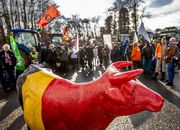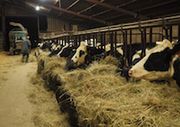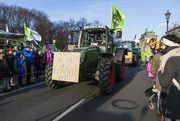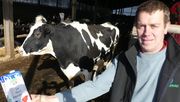EMB Newsletter February 2019
Newsletter as PDF
Contact
EMB - European Milk Board asbl
Rue de la Loi 155
B-1040 Bruxelles
Phone: +32 - 2808 - 1935
Fax: +32 - 2808 - 8265
Dear dairy farmers, dear interested parties,

Brexit: Moment of Truth Approaches
There is a period during any negotiating process when pretence falls away and the bluffing stops. As far as Irish farmers and the wider Irish agri-food sector is concerned, the Brexit process has entered that period now. We are seven weeks away from the date on which the UK exits – unless they ask for an extension to Article 50, something that seems increasingly desirable without necessarily being possible as their domestic political chaos continues. That is where the Mother of Parliaments is at now: they can’t agree, and they can’t even agree to stop the clock while they see if there’s any possibility that they can work out something on which they agree.
In the meantime, the red lights are flashing in every farm, co-op and processing plant in Ireland. We export approximately €5 billion worth of food to the UK. They, in turn, export about €3 billion worth of food back to us. Cheddar is an interesting example, we’ll process the milk and produce cheddar somewhere in Munster or Leinster, it’ll be transported to the UK where it’ll be sprinkled on a dough base which is then stuck into some superfluous packaging with ‘pizza’ printed on it, that in turn will be transported back across the Irish sea to be sold, often in one of the UK owned supermarket chains. Our farming, processing, distribution and retail networks are so intertwined as to be almost indivisible.
From the day after the UK Referendum, the Irish Government made it clear that they were going to prioritise the North-South ‘Political’ dimension - that is the need to preserve the absence of any border installations between the two jurisdictions - over the West-East ‘Economic’ dimension which recognised the fact that the economic ties and trade between Ireland and Great Britain are multiple times greater than the economic ties and trade between Ireland and Northern Ireland or, indeed, between Northern Ireland and Great Britain. We know why they felt they had to choose this priority, those readers old enough to remember the events of 1968 to 1994 in Northern Ireland will understand too why the Irish Government was steadfast that anything that might induce elements to reignite conflict had to be avoided.
But right now, at the time of writing, a Commission spokesman has just confirmed that in the event of a ‘crash out’ No Deal Brexit that a hard border will, in the Commission’s view, be inevitable. Moreover, the UK is stumbling along with no majority for any coherent exit arrangements and all against a background that has that ‘crash out’ as the default setting with all the attendant tariffs etc. that WTO Rules entail.
The two targets Ireland set itself were: No return of a hard border between North and South and (particularly) the continuation of our tariff-free multi-billion Euro, centuries-old food trade with Britain. Right now, neither target is looking particularly achievable and the moment of truth is fast approaching.
Pat McCormack, president of the Irish Creamery Milk Supplier Association ICMSA
Farmers’ border demonstration to demand a stop to CETA & Co.
Lessons learnt from American dairy policy on the sharing of added value
We have had enough of these low milk prices!
Dairy together – a global network for a future-proof dairy market
Milk producer in Beaumont-Hamel just wants fair remuneration for his work
Impressum
European Milk Board asbl
Rue de la Loi 155
B-1040 Bruxelles
Phone: +32 2808 1935
Fax: +32 2808 8265
E-Mail: office@europeanmilkboard.org
Website: http://www.europeanmilkboard.org





